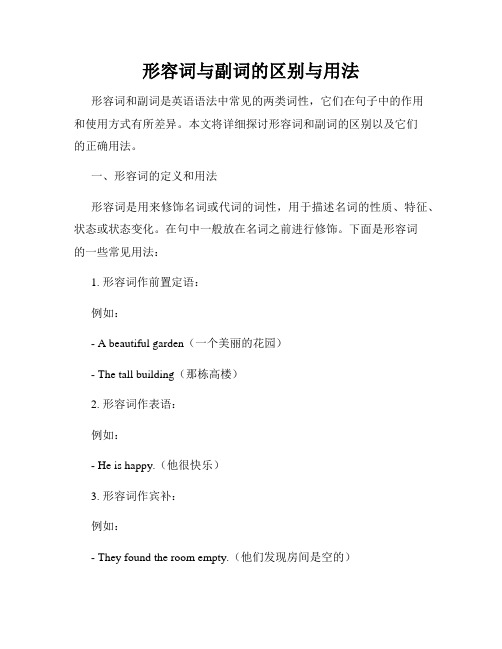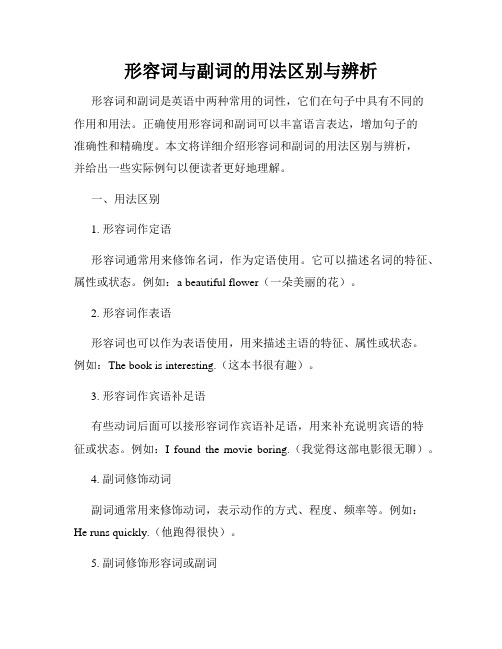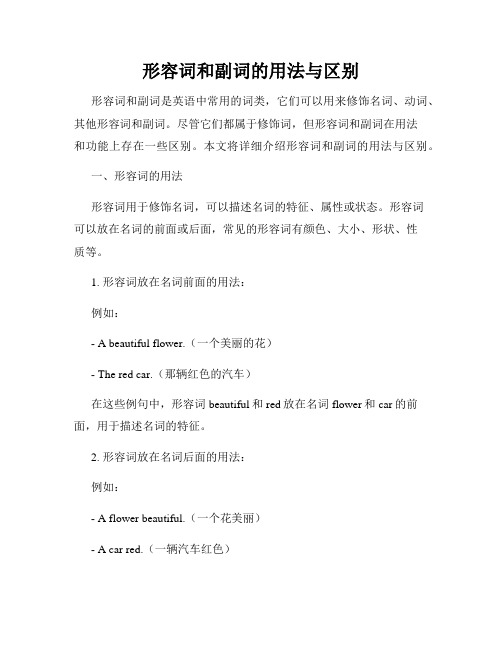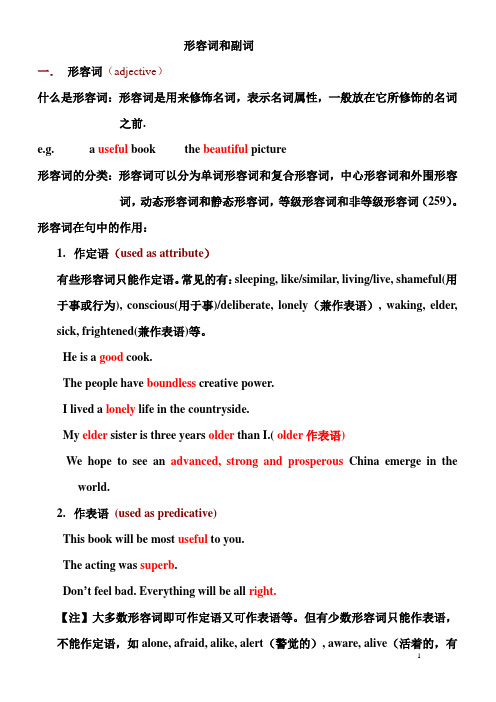4形容词和副词
形容词与副词的区别与用法

形容词与副词的区别与用法形容词和副词是英语语法中常见的两类词性,它们在句子中的作用和使用方式有所差异。
本文将详细探讨形容词和副词的区别以及它们的正确用法。
一、形容词的定义和用法形容词是用来修饰名词或代词的词性,用于描述名词的性质、特征、状态或状态变化。
在句中一般放在名词之前进行修饰。
下面是形容词的一些常见用法:1. 形容词作前置定语:例如:- A beautiful garden(一个美丽的花园)- The tall building(那栋高楼)2. 形容词作表语:例如:- He is happy.(他很快乐)3. 形容词作宾补:例如:- They found the room empty.(他们发现房间是空的)4. 形容词作定语补足语:例如:- I am sure she is right.(我相信她是对的)二、副词的定义和用法副词是修饰动词、形容词、其他副词、句子或句子成分的词性。
副词可以表示时间、地点、方式、程度、原因等各种概念。
下面是副词的一些常见用法:1. 副词修饰动词:例如:- He runs quickly.(他跑得很快)- She speaks fluently.(她讲得很流利)2. 副词修饰形容词或其他副词:例如:- The house is very beautiful.(房子非常漂亮)- He speaks quite softly.(他说话非常轻声细语)3. 副词修饰句子或句子成分:例如:- Unfortunately, I can't attend the meeting.(不幸的是,我不能参加会议)- She arrived late.(她到达得很晚)三、形容词和副词的比较尽管形容词和副词有一些相似之处,但它们在用法上有一些明显的区别。
1. 修饰词性不同:形容词修饰名词,描述名词的性质或状态;副词修饰动词、形容词或其他副词,表示时间、地点、方式、程度等。
2. 位置不同:形容词一般放在名词前面,修饰名词;副词一般放在动词、形容词或其他副词之后,修饰它们。
形容词与副词的用法区别与辨析

形容词与副词的用法区别与辨析形容词和副词是英语中两种常用的词性,它们在句子中具有不同的作用和用法。
正确使用形容词和副词可以丰富语言表达,增加句子的准确性和精确度。
本文将详细介绍形容词和副词的用法区别与辨析,并给出一些实际例句以便读者更好地理解。
一、用法区别1. 形容词作定语形容词通常用来修饰名词,作为定语使用。
它可以描述名词的特征、属性或状态。
例如:a beautiful flower(一朵美丽的花)。
2. 形容词作表语形容词也可以作为表语使用,用来描述主语的特征、属性或状态。
例如:The book is interesting.(这本书很有趣)。
3. 形容词作宾语补足语有些动词后面可以接形容词作宾语补足语,用来补充说明宾语的特征或状态。
例如:I found the movie boring.(我觉得这部电影很无聊)。
4. 副词修饰动词副词通常用来修饰动词,表示动作的方式、程度、频率等。
例如:He runs quickly.(他跑得很快)。
5. 副词修饰形容词或副词副词也可以用来修饰形容词或副词,表示程度或程度的比较。
例如:She is very beautiful.(她非常漂亮)。
6. 副词作状语副词可以作状语,修饰整个句子或者句子中的某一部分,表示时间、地点、方式、原因、目的等。
例如:He speaks English fluently.(他英语说得很流利)。
二、用法辨析1. 形容词和副词的形式不同形容词和副词的形式有所不同,在大多数情况下,形容词以-y结尾的单词变为副词时,将-y改为-i再加-ly。
例如:happy(形容词)→ happily(副词)。
2. 形容词描述名词,副词描述动词形容词通常用来描述名词,表示名词的性质、状态等;而副词主要用于修饰动词,表示动作的方式、程度、频率等。
3. 形容词有属格和比较级形式,副词没有形容词可以使用属格形式和比较级形式,用来表示所有关系和比较程度。
例如:John's house(约翰的房子)、more beautiful(更美丽)。
形容词和副词的用法与区别

形容词和副词的用法与区别形容词和副词是英语中常用的词类,它们可以用来修饰名词、动词、其他形容词和副词。
尽管它们都属于修饰词,但形容词和副词在用法和功能上存在一些区别。
本文将详细介绍形容词和副词的用法与区别。
一、形容词的用法形容词用于修饰名词,可以描述名词的特征、属性或状态。
形容词可以放在名词的前面或后面,常见的形容词有颜色、大小、形状、性质等。
1. 形容词放在名词前面的用法:例如:- A beautiful flower.(一个美丽的花)- The red car.(那辆红色的汽车)在这些例句中,形容词beautiful和red放在名词flower和car的前面,用于描述名词的特征。
2. 形容词放在名词后面的用法:例如:- A flower beautiful.(一个花美丽)- A car red.(一辆汽车红色)在这些例句中,形容词beautiful和red放在名词flower和car的后面,也用于描述名词的特征。
除了修饰名词外,形容词还可以作为系动词(如be动词)的补语,用于描述主语。
例如:- She is happy.(她很开心)- The box is heavy.(这个盒子很重)二、副词的用法副词用于修饰动词、形容词、其他副词和整个句子,可以表示时间、地点、方式、程度等不同的语义。
副词通常放在动词后面,形容词和副词前面。
1. 修饰动词的副词用法:例如:- She runs quickly.(她跑得很快)- He speaks fluently.(他说得很流利)在这些例句中,副词quickly和fluently修饰动词runs和speaks,表示动作的方式或速度。
2. 修饰形容词的副词用法:例如:- The car is very fast.(这辆车非常快)- He is quite tall.(他相当高)在这些例句中,副词very和quite修饰形容词fast和tall,表示程度或强调。
4形容词和副词(1)

形容词和副词一.形容词(adjective)什么是形容词:形容词是用来修饰名词,表示名词属性,一般放在它所修饰的名词之前.e.g. a useful book the beautiful picture形容词的分类:形容词可以分为单词形容词和复合形容词,中心形容词和外围形容词,动态形容词和静态形容词,等级形容词和非等级形容词(259)。
形容词在句中的作用:1.作定语(used as attribute)有些形容词只能作定语。
常见的有:sleeping, like/similar, living/live, shameful(用于事或行为), conscious(用于事)/deliberate, lonely(兼作表语), waking, elder, sick, frightened(兼作表语)等。
He is a good cook.The people have boundless creative power.I lived a lonely life in the countryside.My elder sister is three years older than I.( older作表语)We hope to see an advanced, strong and prosperous China emerge in theworld.2.作表语(used as predicative)This book will be most useful to you.The acting was superb.Don’t feel bad. Everything will be all right.【注】大多数形容词即可作定语又可作表语等。
但有少数形容词只能作表语,不能作定语,如alone, afraid, alike, alert(警觉的), aware, alive(活着的,有活力的), ashamed, content(满意的), unable, asleep, awake, older, ill等等。
四、形容词、副词

• • •
[误] I have important something to tell you. [正] I have something important to tell you. [析] 不定代词something, anyone, somebody…在用形容词修 饰时,形容词应放其后。但要注意thing则不是不定代词,不符合 上述规律。如:I have an important thing to tell you. • [误] I'll be free on next Sunday. • [正] I'll be free next Sunday. • [析] 在表达将来时的时候:next Sunday, next week, next year或last Sunday last week, last year前都不加介词。
• • •
• • •
Байду номын сангаас
[误] It is the gold age of the young. [正] It is the golden age of the young. [析] golden在英语中多用于比喻,如:golden hair 金发,gulden voice金嗓子。而gold多用于表达金质的, 如:a gold bar金条,a gold coin金币,但gold fish 金 鱼例外。 • [误] She is a warm heart woman. • [正] She is a warmhearted woman. • [析] 英语形容词的构词法很多,其中之一是由形容 词,或数词,加名词加ed构成,如:warmhoarted 热心肠的,whitehaired 白毛的
• [误] The foreigners like those little beautiful Chinese paintings. • [正] The foreigners like those beautiful little Chinese paintings. • [析] 在名词前若有几个形容词作修饰语时,其顺序如下。 • 1. 指示代词,定冠词 2. 数量词 3. 性质词 4. 大小 5. 形状 6. 老 少,新旧 7. 颜色 8. 材料 • 但要注意的是英语的习惯是一个名词前的形容词一般不要多于三 个。 • 如: What a pretty little white horse! • Those first few short English stories were not difficult to understand.
四形容词和副词的比较级最高级

四、形容词和副词的比较级、最高级(Comparison of Adjectives and Adverbs)I. 形容词比较级和最高级的形式一、形容词比较级和最高级的构成⑥合成形容词的比较等级•大多数在前面加more及most。
例如:home-sick, more home-sick, most home-sickup-to-date, more up-to-date, most up-to-date•若第一个词是大家熟悉的单音节词,则-er及-est都加在这个词的前面。
例:Long-lasting, longer-lasting, longest-lastinghard-working, harder-working, hardest-workingKind-hearted, kinder-hearted, kindest-heartedWell-known, better-known, best-known二、不规则形容词的比较级和最高级形式II.副词比较级和最高级的形式副词比较级和最高级的变化形式与形容词基本上一样。
一、一般副词hard→harder →hardest fast→faster →fastestlate→later →latest early→earlier →earliest二、特殊副词well →better →best much →more →mostbadly →worse →worst little →less →least三、开放类副词开放类副词即以后缀-ly结尾的副词不能像形容词那样加-er或-est,而应在副词原形前加more或most。
如:quickly →more quickly →most quickly quietly →more quietly →most qui etlyIII.形容词与副词比较级和最高级的基本用法一、比较级1.比较级通常由“形容词(副词)比较级+than+…”构成,表示在两者中间一方比另一方“更加……”。
形容词和副词的比较等级
The room is three times as big as mine. = The room is _tw__ic_e__b_ig_g_e_r_t_h_a_n__ mine.
The river is five times as long as that one. = The river isfo_u_r__ti_m_e_s__lo_n_g_e_r_t_h_a_n_ that one.
某些单音节词,+more, most 构成比较级和最高级。 glad – more glad – most glad pleased – more pleased – most pleased tired – more tired – most tired often-more often- most often
any other river in China.
other +n.(复) 其他……
比较级+than + any +n.(单)
任何一个……
any other+ n. (单) 其他任何一个……
My arms are longer than yours. He is taller than I.
比较必须在同类中进行,即人与人比,物与物比。
5.the+比较级…,the+比较级… “越……,越……” The bigger,the better.
温馨提示:
当某一人/事物与其他人/事物作比较时,被比较的事物中不能包括
本身。
other rivers in China.
Changjiang is longer than any river in Japan.
形容词和副词的知识点归纳
形容词和副词的知识点归纳一、形容词。
1. 定义与作用。
- 形容词主要用来描写或修饰名词或代词,表示人或事物的性质、状态、特征或属性。
例如:“a beautiful flower”(美丽的花朵),“beautiful”修饰名词“flower”,描述花的特征。
2. 形容词的位置。
- 前置修饰:- 一般情况下,形容词位于名词之前,作定语。
如:“a tall boy”(一个高个子男孩)。
- 当有多个形容词修饰同一个名词时,存在一定的顺序:限定词(如a, an, the 等)+描绘性形容词(如beautiful, nice等)+大小、长短、高低等形容词(如big, small等)+形状形容词(如round, square等)+年龄、新旧形容词(如new, old 等)+颜色形容词(如red, blue等)+国籍、地区形容词(如Chinese, American 等)+材料形容词(如wooden, plastic等)+用途、类别形容词(如writing, reading等)。
例如:“a beautiful small round new red Chinese woodenwriting desk”(一张漂亮的、小的、圆的、新的、红色的、中国的、木制的写字台)。
- 后置修饰:- 当形容词修饰不定代词(something, anything, nothing等)时,形容词后置。
例如:“There is something important to tell you.”(有一些重要的事情要告诉你)。
- 在一些固定结构中,形容词后置,如“the people present”(在场的人)。
3. 形容词的比较级和最高级。
- 规则变化:- 一般在词尾加 -er(比较级)和 -est(最高级)。
如:tall - taller - tallest。
- 以不发音的e结尾的单词,加 -r和 -st。
如:nice - nicer - nicest。
形容词副词
happy,friendly,careful,happily,true,real,
hard,early,carefully,truly,really,hardly,fast,
quick,quickly,good,well,bad,badly,strong,
形容词 、副词
1, ①如何区分形容词(的)和副词(地 -ly) happy-happily real-really true-truly
usual-usually bad-badly loud-loudly
lucky-luckily kind-kindly quick-quickly
polite-politely slow-slowly easy-easily
fat --- fatter --- fattest glad—gladder--gladdest
4、以“辅音字母+ y”结尾的单词,先改y为i, 再加-er或-est。除
early 外,以ly结尾的单词,一般在词前加more / most.
easy easier easiest
happy happier happiest
一,②形容词和副词在句中的位置:
1,be+形容词
I am_h_appy ( happy, happily). He is s_u_ccessful (successful, successfully). Lucy is k__ind (kind, kindly). 2,形容词+名词 I am a _h_a_ppy student. (happy, happily) He is a _su_ccessfmulan. (successful, successfully) Lucy is ak_i_nd doctor. (kind, kindly)
形容词与副词的区别及用法
形容词与副词的区别及用法形容词及副词是英语语法中常见的词性,它们在句子中起到描述或修饰名词、动词、形容词、副词等的作用。
虽然形容词和副词都能表达属性或程度,但它们在用法和位置上有所区别。
本文将对形容词和副词的区别及用法进行详细解析。
一、形容词的定义及用法:形容词是一类用来修饰名词或代词、限定名词的词汇,它能够描述名词的性质、状态、特征等。
形容词一般出现在名词前面,用来限定或修饰名词,帮助读者更准确地了解名词的属性。
1. 描述性形容词:描述性形容词是用来描述名词的外观、颜色、形状、大小、年龄、国籍等特征的词语。
比如:"beautiful"(美丽的)、"tall"(高的)、"old"(老的)、"Chinese"(中国的)等。
2. 定限性形容词:定限性形容词是用来限定名词范围的形容词,它们通常具有明确的标志,如:"this"(这个)、"some"(一些)、"many"(许多)、"every"(每个)等。
定限性形容词在句子中的位置通常位于名词的前面,起到限定名词范围的作用。
3. 参照性形容词:参照性形容词是指与名词间具有某种关联或对比关系的形容词,它们通常是根据上下文的需要来确定其具体含义的形容词。
比如:"former"(前任的)、"same"(相同的)、"different"(不同的)等。
二、副词的定义及用法:副词是一类用来修饰动词、形容词、其他副词或整个句子的词汇,它可以表示时间、地点、程度、方式、原因、频率等概念。
副词可以帮助读者更加准确地理解句子中动作发生的时间、地点、方式以及程度等信息。
1. 时间副词:时间副词用来描述动作发生的时间,它可以回答以下问题:"when"(什么时候)或"how long"(多久)等。
- 1、下载文档前请自行甄别文档内容的完整性,平台不提供额外的编辑、内容补充、找答案等附加服务。
- 2、"仅部分预览"的文档,不可在线预览部分如存在完整性等问题,可反馈申请退款(可完整预览的文档不适用该条件!)。
- 3、如文档侵犯您的权益,请联系客服反馈,我们会尽快为您处理(人工客服工作时间:9:00-18:30)。
四.形容词&副词
填词:
1. The river was so polluted that it_____ (actual) caught fire and burned.
2. Finally, that hard work paid off and now the water in the river is _______(clean)than ever.
3. While there are ________ (amaze )stories of instant transportation, for most of us the changes are gradual and require a lot of effort and work, like cleaning up a polluted river.
4. Just be________( patience).
5. There were many people waiting at the bus stop, and some of them looked very anxious and ______(diappear).
6. Everyone on the bus began talking about what the boy had done, and the crowd of strangers_________(sudden) became friendly to one another.
7. Bend your knees slightly and reach out your arms like tree branches, naturally and
______(soft).
8.I cannot control my body well.My legs become ______(pain).
9. The _____(hard) you try to beat him, the more likely you will get hit. He controls you.
10. We had made our reservation six months ______ (early), but the man at the front desk said there had been a mistake.
11. When we were wondering what to do, the manager came out. She was ______(surprise) helpful.
12. Over time, the high cost of living became a little burden on my already ________ ( exhaust) shoulders.
13. A note is often a ______(good) way to "talk "with a child than using the telephone.
14. " That would be a very ________(reason) thing to do in a big city, but it could destroy a
small village like ours,” Nick said.
15. But such a small thing couldn't _______ (possible) destroy a village.
16. Mary felt _(please), because there were many empty seats in the room.
17. I left it early because I had an appointment ______ (late) that day.
18. He must be_______ (mental) disabled.
19. His teacher took a deep drink, smiled _______ (warm), and thanked his student very much
for the sweet water.
20. The water was simply the container for an act of kindness and love. Nothing could be
_______ (sweet).
改错:
1.Nearly five years ago, and with the help of our father, my sister and I planted some cherry tomatoes(圣女果)in our back garden. Since then -for all these years -we have been allowing tomatoes to self-seed where they please. As a result, the plants are growing somewhere.
2. The fruits are small in size, but juicy and taste. There are so many that we often share them with our neighbors.
3. We are growing wonderfully tomatoes at no cost!
4. They are three lessons in the morning and two in the afternoon. We don’t need to do so many homework.
5. The teachers here are kind and helpfully. They are not only our teachers but also our friends.
6. That is too much for us, considering how closely the houses are.
7.One evening at sunset, we sat by the fire, having our barbecue. Just then a bird was flying over us, My uncles immediate jumped up and shot their arrows at the bird
8. Don't panic or get out of line, and try to remain quiet and calmly.
9. I was taking a train to London’s Victoria Station. I noticed that the carriage was noise and f illed with people.
10. No one in the carriage had previous spoken to or even noticed the ticket-owner before.
11. So really friendship should be able to stand all sorts of tests. And it is wise to have as many good friends as we can.
12. Today we had a chemistry test. I found the test difficult, but I tried hardly to do it.
13. After waiting for half an hour, I was beginning to get impatiently. I wanted to give up, but my grandfather told me to wait a little longer.
14. Tomorrow is the first day of school. I am awfully tiring, but I know I'll never fall asleep
15. I remember my grandfather very much. He was tall, with broad shoulders and a beard that turned from back to gray over the years.。
